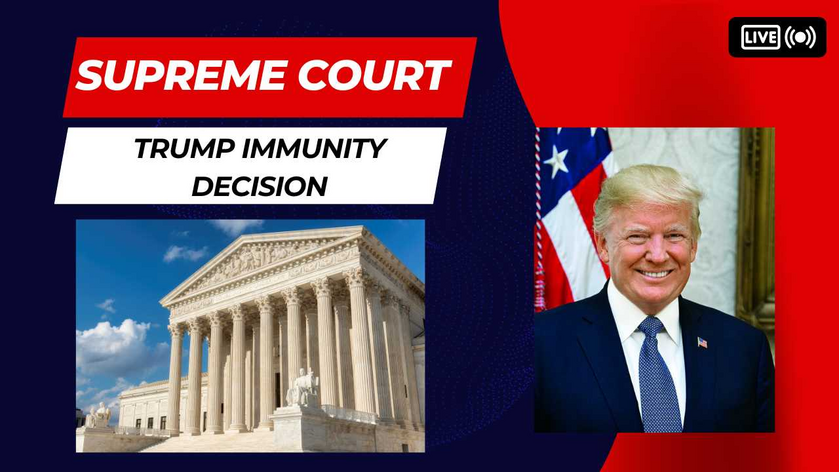WASHINGTON D.C. – The Supreme Court ruled Monday in Trump v. United States that a former president has substantial immunity from prosecution for official acts committed while in office but not for unofficial acts.
The Court sent the matter back down to a lower court, as the justices did not apply the ruling to whether or not former President Trump is immune from prosecution regarding actions related to efforts to overturn the results of the 2020 election.
In a closely watched decision, the U.S. Supreme Court has ruled that the determination of former President Donald Trump’s immunity must first be addressed by the lower courts. Chief Justice John Roberts, in the majority opinion, stated that the trial court must now assess which of Trump's alleged actions are protected under the new guidelines established by the high court.
I left mainstream media to bring you unique, straightforward news. Support my work by becoming a paid subscriber for $5 a month. You can cancel anytime. Help me keep this going!
Chief Justice Roberts emphasized that the trial court would require additional briefing to make this determination. "We accordingly remand to the District Court to determine in the first instance — with the benefit of briefing we lack — whether Trump’s conduct in this area qualifies as official or unofficial," Roberts wrote. He criticized the previous lower court rulings for their lack of detailed factual analysis when rejecting Trump’s immunity claims and countered a dissenting opinion from Justice Ketanji Brown Jackson, who argued for a more comprehensive definition of presidential immunity.
Click here for the complete decision from the Supreme Court.
In a forceful dissent, Justice Sonia Sotomayor criticized the majority opinion, asserting that it effectively places the President above the law. "Let the President violate the law, let him exploit the trappings of his office for personal gain, let him use his official power for evil ends," Sotomayor wrote. She warned that this ruling could irrevocably damage the relationship between the President and the American people, making the President akin to a "king above the law." Concluding her dissent without the customary “respectfully” language, she wrote, “With fear for our democracy, I dissent.”
Chief Justice Roberts clarified that while presidents require immunity for their official acts, this immunity is not all-encompassing. "The President enjoys no immunity for his unofficial acts, and not everything the President does is official. The President is not above the law," Roberts wrote. He added that Congress cannot criminalize the President’s conduct in executing the responsibilities of the Executive Branch as defined by the Constitution.
Trump released the following statement:

The decision, which was 6-3 along conservative-liberal lines, complicates the legal landscape for Trump, especially regarding the federal election subversion charges linked to his efforts to overturn the 2020 election results. The ruling overturns a February decision by a federal appeals court that had denied Trump any immunity for his alleged actions during the end of his presidency.
This ruling, while granting Trump some immunity for official acts, leaves open the possibility of prosecution for actions deemed unofficial, sending the case back to the lower courts for further examination. CNN is continuing to review the implications of this landmark decision.
The Biden campaign says the Supreme Court’s ruling on presidential immunity “doesn’t change the facts,” and doubled down on allegations that former President Donald Trump “snapped” when he lost the 2020 election to Joe Biden.
“Donald Trump snapped after he lost the 2020 election and encouraged a mob to overthrow the results of a free and fair election,” a senior campaign adviser said in a statement shortly after the court issued the decision. “Trump is already running for president as a convicted felon for the very same reason he sat idly by while the mob violently attacked the Capitol: he thinks he’s above the law and is willing to do anything to gain and hold onto power for himself.”




















